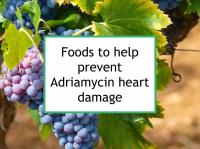Chemotherapy that contains doxorubicin can cause cardiomyopathy, heart damage with potentially serious consequences. Although all breast cancer patients treated with this drug are potentially vulnerable, the risk of doxorubicin-induced cardiomyopathy is heightened under some circumstances.
Certain foods have been found to protect against doxorubicin-induced cardiomyopathy in laboratory animals without interfering with doxorubicin's cytotoxic effects against breast cancer cells.
Cardiomyopathy is a potential side effect of doxorubicin
Doxorubicin has the potential to cause cardiomyopathy, heart muscle damage that can result in heart failure. Symptoms of cardiomyopathy can become apparent during chemotherapy, shortly afterwards, or years later. The damage can resolve quickly or be so severe as to cause death. At the moment, there is no treatment that can reverse the damage.
Rates of chemotherapy-induced cardiomyopathy have variously been estimated at 2% to 15%. Doxorubicin is the best known breast cancer drug that induces cardiomyopathy, however epirubicin, 5-FU, and platinum chemotherapy drugs such as cisplatin, as well as trastuzumab (Herceptin), can also contribute to cardiomyopathy.
Risk of cardiomyopathy is heightened under some circumstances
The combination of doxorubicin plus trastuzumab (used to treated HER2 overexpressing breast cancer (HER2+)) is associated with an elevated risk of cardiomyopathy compared to doxorubicin alone. One study reported that use of the NSAID naproxen (Aleve) worsened doxorubicin-induced cardiomyopathy in rats. BRCA1 or BRCA2 mutation carriers appear to be at heightened risk of anthracycline-induced cardiomyopathy.
Some foods can reduce doxorubicin toxic side effects
Although women with pre-existing cardiovascular disease are more vulnerable to the effects of cardiomyopathy, all breast cancer patients treated with doxorubicin should consider themselves to be potentially vulnerable to this side effect. Generally speaking, it is not possible to identify which patients will experience permanent doxorubicin-induced heart damage. Evaluation of cardiac function before, during and after treatment with an doxorubicin-based regimen can help identify cardiomyopathy, but it is not preventative.
The foods below have been found to protect against doxorubicin-induced cardiomyopathy in laboratory animals without interfering with the anti-cancer effects of the treatment:
Latest research shows grape reduces doxorubicin damage in rats
The study referenced at the beginning of this news article was designed to investigate whether pre-treatment with an extract made up of grape seed and grape skin could reduce the cardiotoxicity of doxorubicin in rats. Doxorubicin-induced cardiotoxicity appears to be the result of increased oxidative stress. The authors hypothesized that pre-treatment with an extract of grape seed and grape skin, a commonly used antioxidant agent, might alleviate the cardiotoxicity. In the study, one group of rats was injected with grape seed/skin extract for eight days. A control group of rats did not receive this treatment. On the fourth day, all of the rats received a single dose of doxorubicin. After the eight-day treatment period ended, the rat hearts were evaluated using a variety of techniques. Doxorubicin was found to markedly affect heart activity. On the other hand, the rats that received the grape seed/skin extract had reduced doxorubicin-induced disturbances of heart function.
Grapes and grape juice are preferable to resveratrol
Although resveratrol is the best know anti-cancer component of grape seed and grape skin, other grape polyphenols also have chemopreventive effects and appear to work in synergy with resveratrol. In addition, there is some evidence that concentrated resveratrol can promote breast cancer cell migration and invasion at some dosage levels. Also, note that grape seed oil (including virgin grape seed oil) is not a good source of grape polyphenols.
Please see our article on breast cancer diet during doxorubicin chemotherapy for more information on how to optimize treatment and reduce side effects.
